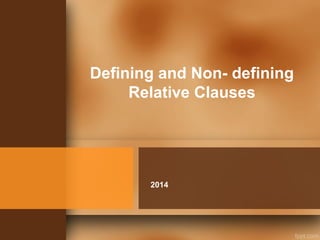
Defining and non defining relative clauses
- 1. Defining and Non- defining Relative Clauses 2014
- 2. Introduction Relative clauses add extra information to a sentence by defining a noun or to define or identify the person or thing we are talking about. Obviously, this is only necessary if there is more than one person or thing involved. They are usually divided into two types:
- 3. The Relative Pronouns The Relative Pronouns link the main clause with the relative clause. In the defining relative clauses we use: WHO / THAT for people. THAT for things. WHERE for places. WHOSE for possessions.
- 4. The Relative Pronouns On the other hand in the non-defining relative clauses we use: WHO for people. WHICH for things. WHERE for places. WHOSE for possessions.
- 5. The Relative Pronouns It's important to mention that if the relative pronoun is the object of the verb in the relative clause, we have to leave it out: Have you sold the car that you drove ? It's better to say: Have you sold the car you drove?
- 6. The Relative Pronouns When the pronoun is the subject of the main clause and also the object of the relative clause, we don't have to repeat it: The woman is a doctor. I met her. Can be turn into: The woman who I met her is a doctor.
- 7. The Defining Relative Clauses In this kind of clause, the information is essential to make sense of the main clause. For example: I like the woman who lives next door. (If I don't say 'who lives next door', then we don't know which woman I mean).
- 8. The Non-Defining Relative Clauses In this kind of clause, the information is not essential, that means the main clause makes sense without it. For example: I live in Arica, which has some fantastic valleys. (Everybody in this class knows Arica, so
- 9. The non-defining relative clauses In this kind of clauses, the relative clause is separated by commas from the main clause: Examples: My best friend, who is very nice, lives in Manchester. Last week I bought a new computer, which I
- 10. The non-defining relative clauses We also cannot leave out relative pronouns in this kind of clauses: Examples: I really love the new Chinese restaurant, which we went to last night. It can't be:
- 11. Let's Practice!
- 12. Are these relative clauses defining or non-defining? 1. London, which is the capital of England, is one of the largest cities in the world. 2. This is the dress my mother has made for me. 3. Queen Elizabeth II, who is 83, has been the queen of England for 57 years now. 4. That's the dog that bit me. 5. Tom Cruise, who has starred a lot of films, is a famous American actor. 6. The village where I grew up is very small.
- 13. Are these relative clauses defining or non-defining? 1. London, which is the capital of England, is one of the largest cities in the world. NON- DEFINING 2. This is the dress my mother has made for me. DEFINING 3. Queen Elizabeth II, who is 83, has been the queen of England for 57 years now. NON-DEFINING 4. That's the dog that bit me. DEFINING 5. Tom Cruise, who has starred a lot of films,
- 14. Choose the right relative pronoun to complete these sentences. 1. Jim, __________ I've known for years, is my best friend. 2. My new coat, __________ I bought in New York, is very warm and comfortable. 3. My boss, ___________ wife is French, travels to Paris regularly. 4. He didn't even say "thank you", __________ I found really rude. 5. Next summer I'm going to India, _________ I've never been before.
- 15. Choose the right relative pronoun to complete these sentences. 1. Jim, WHO I've known for years, is my best friend. 2. My new coat, WHICH I bought in New York, is very warm and comfortable. 3. My boss, WHOSE wife is French, travels to Paris regularly. 4. He didn't even say "thank you", WHICH I found really rude. 5. Next summer I'm going to India, WHERE I've never been before.
- 16. Join these sentences using relative pronouns beginning with the words given. Omit the pronoun if possible. add commas if necessary. 1. My school is very big. It is in Madrid. 2. Robert Pattinson is an actor. He plays Edward Cullen in the Twilight saga. 3. Robert Pattinson is a British actor. He plays Edward Cullen in the Twilight saga. 4. I bought this cake yesterday. It tastes delicious. 5. Michael is a policeman. His father is a judge. 6. I bought a computer last month. It doesn't
- 17. Join these sentences using relative pronouns beginning with the words given. Omit the pronoun if possible. add commas if necessary. 1. My school, which is in Mdrid, is very big. 2. Robert Pattinson is the actor, who plays Edward Cullen in the Twilight saga. 3. Robert Pattinson, who plays Edward Cullen in the Twilight saga, is a British actor. 4. The cake that I bought yesterday tastes delicious. 5. Michael, whose father is a judge, is a policeman. 6. The computer I bought yesterday doesn't
- 18. Material created and selected by Danitza Lazcano Flores Teacher of English Master in Education and Educational counselor
